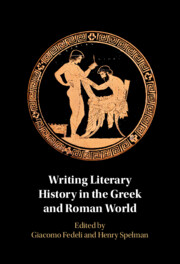Book contents
- Writing Literary History in the Greek and Roman World
- Writing Literary History in the Greek and Roman World
- Copyright page
- Contents
- Contributors
- Introduction
- Part I Between Literature and Scholarship
- Chapter 1 Writing the Beginnings of Greek Literary History
- Chapter 2 Contrasting Pairs and Twin Graves
- Chapter 3 Ancient Histories of Satire(s)
- Chapter 4 Cicero as a Literary Historian
- Chapter 5 Varro and the Spirits of Rome’s Literary Past
- Part II Lives and Afterlives
- Part III Narratives of Change
- Epilogue
- Afterword
- Bibliography
- Index Locorum
- Index of Subjects
Chapter 1 - Writing the Beginnings of Greek Literary History
from Part I - Between Literature and Scholarship
Published online by Cambridge University Press: 07 June 2024
- Writing Literary History in the Greek and Roman World
- Writing Literary History in the Greek and Roman World
- Copyright page
- Contents
- Contributors
- Introduction
- Part I Between Literature and Scholarship
- Chapter 1 Writing the Beginnings of Greek Literary History
- Chapter 2 Contrasting Pairs and Twin Graves
- Chapter 3 Ancient Histories of Satire(s)
- Chapter 4 Cicero as a Literary Historian
- Chapter 5 Varro and the Spirits of Rome’s Literary Past
- Part II Lives and Afterlives
- Part III Narratives of Change
- Epilogue
- Afterword
- Bibliography
- Index Locorum
- Index of Subjects
Summary
This chapter considers the nature and development of Greek literary history before Aristotle, a generally acknowledged watershed. It covers all sorts of reflections on the literary past and studies the assumptions and paradigms at work in our earliest sources. While highlighting the continuity of tropes and stock narratives, it also seeks to understand the development of literary history in relation to the technology of writing and in relation to an emergent ideology of classicism, which literary historical thinking both reacted to and further strengthened. The first section briefly surveys immanent literary history in poetry from Homer to Aristophanes, typologising tropes which would endure through the ages and suggesting a skeletal metahistory of early literary history. The second and third sections then move forward in time and shift from poetry to prose in order to consider in greater detail two specific work. Glaucus of Rhegium’s On the Archaic Poets and Musicians and the Mouseion of the sophist Alcidamas, early instantiations of, respectively, a macroscopic narrative of progress and a literary biography, prefigure many core characteristics of later ancient literary history. A conclusion returns to the bigger picture to consider the distinctive value of studying ancient literary history on its own terms.
- Type
- Chapter
- Information
- Writing Literary History in the Greek and Roman World , pp. 21 - 39Publisher: Cambridge University PressPrint publication year: 2024

